Comparing the rise in pedestrian deaths to an epidemic that deserves a public health response similar to what we saw with Covid-19, the Portland based nonprofit The Street Trust has laid out a list of six steps Oregon should take to make streets safer.
“We need to tackle these rising death rates at the root (route) cause: the continued investment and prioritization of the automobile and driving alone at the expense of the health and well being of people, communities, the environment, and the economy,” wrote The Street Trust Executive Director Sarah Iannarone in an article released Thursday.
The article was cheekily titled, “What Oregon Can Do to End Traffic Deaths (Besides Close Crosswalks),” (a reference to ODOT’s recent move to close over 180 crosswalks in the Portland region as part of an ADA safety initiative).
The push from The Street Trust comes as the number of people who died while walking on Oregon highways was up about 45% in 2022 compared to the previous year (see chart at right). That statistic gives this issue added urgency. And The Street Trust’s focus is well-timed because the Oregon Department of Transportation is well aware of the problem and is actively looking for remedies.
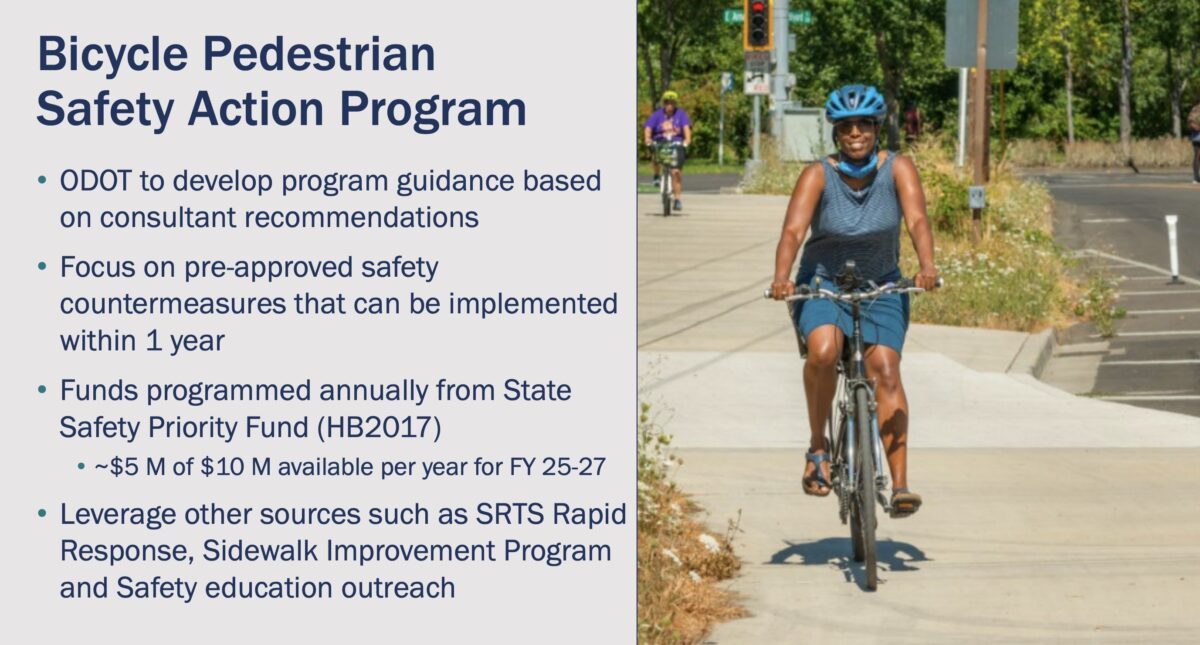
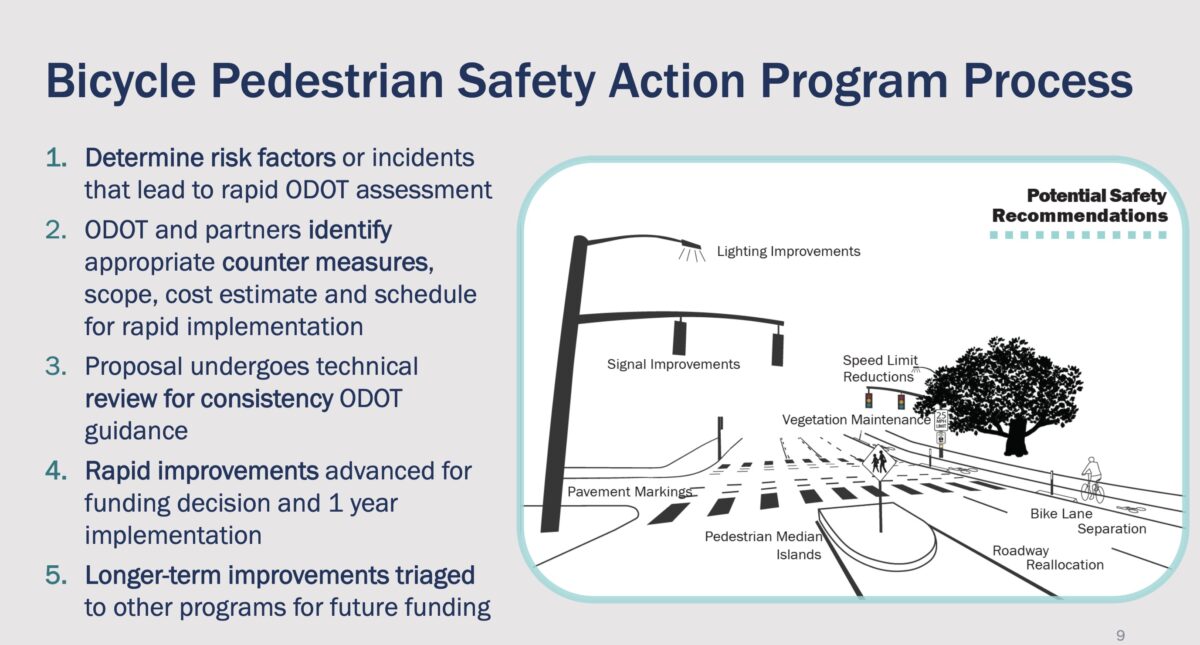
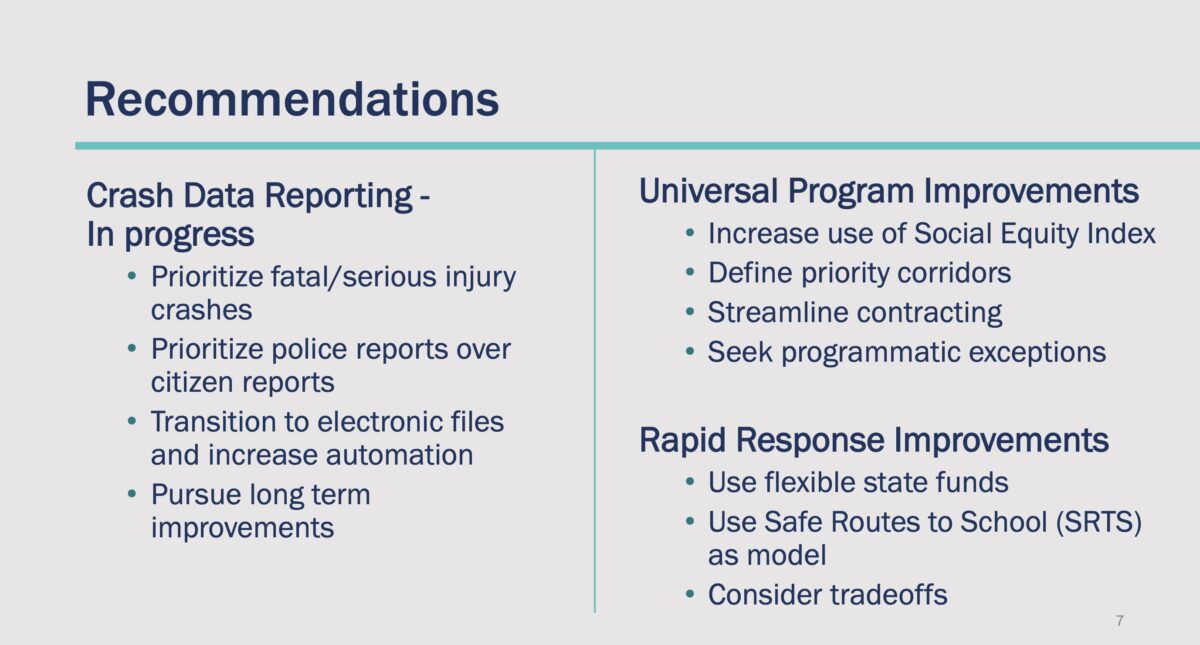
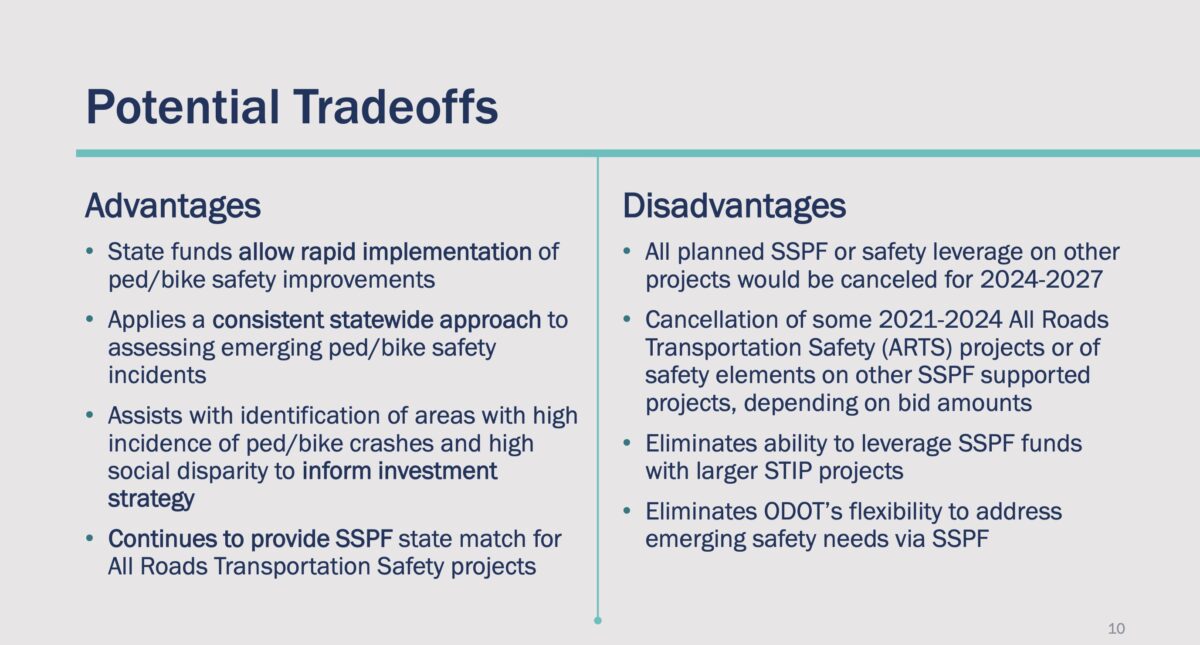
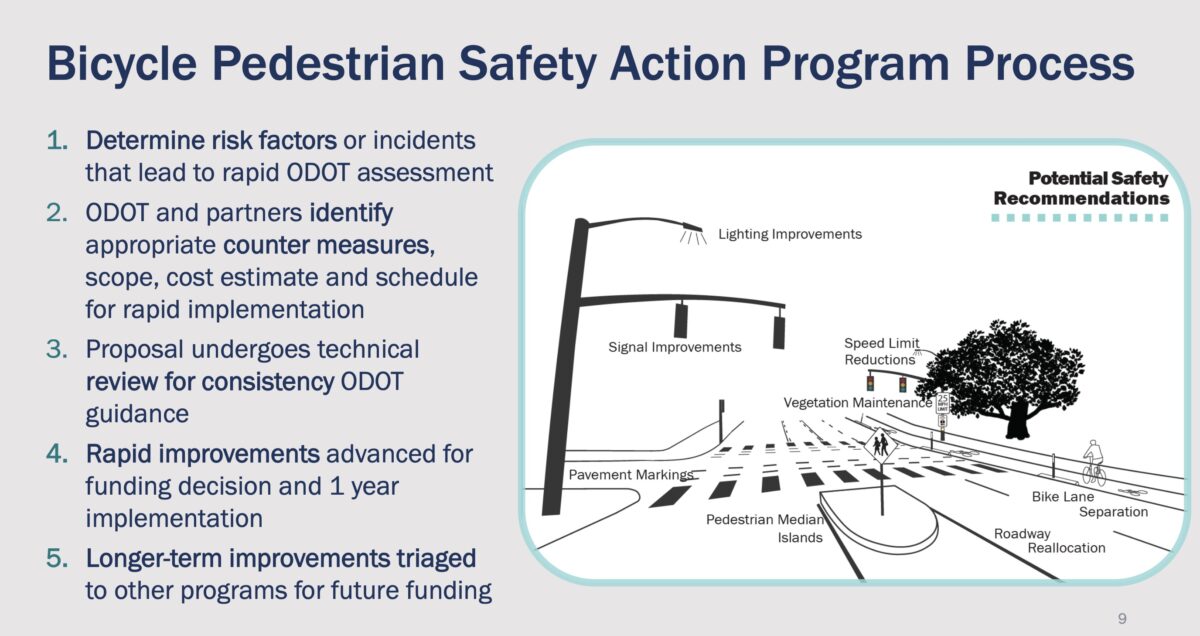
At a meeting of the Oregon Transportation Commission on March 9th, ODOT Public Transportation Division Administrator Karyn Criswell shared a presentation on the Bicycle Pedestrian Safety Action Program, a proposed new program that would look to streamline severe crash responses, speed up infrastructure solutions, and redirect funding from car and truck safety issues directly to more pedestrian-focused projects. “Severe and fatal crashes involving people walking and biking have been happening far too often and they are on the rise,” Criswell told OTC members in her pitch for the new program.
“The numbers demand an action and w’re prepared to move in that direction,” said ODOT Delivery and Operations Administrator Mac Lynde at the meeting.
The Street Trust wants to keep pushing ODOT to do more and they’ve come up with six things they think Oregon could do this year to bend the pedestrian death curve downward:
- Redirect resources from driving alone toward walking, biking, rolling and using public transit.
- Be honest when we talk about “safety” and align spending with road user injuries and fatalities.
- Enforce reduced speeds with traffic cams and implement fines equitably.
- Establish community-led Fatal Crash Review Commissions to examine the root causes of crashes.
- Develop a statewide ‘Orphan Highways’ Improvement Strategy and Plan.
- Establish a task force for a statewide public health campaign around street safety.
Iannarone said she doesn’t expect masses of Oregonians to give up driving until viable alternatives are more robust, but she thinks, “A stated commitment to safety from our elected officials, a focus on community engagement, and coordinated safety investments across our siloed governments and agencies would be a start on the right track.” (Read more from her article here.)
For ODOT’s part, they hope to formally launch the Bicycle Pedestrian Safety Action Program later this year.



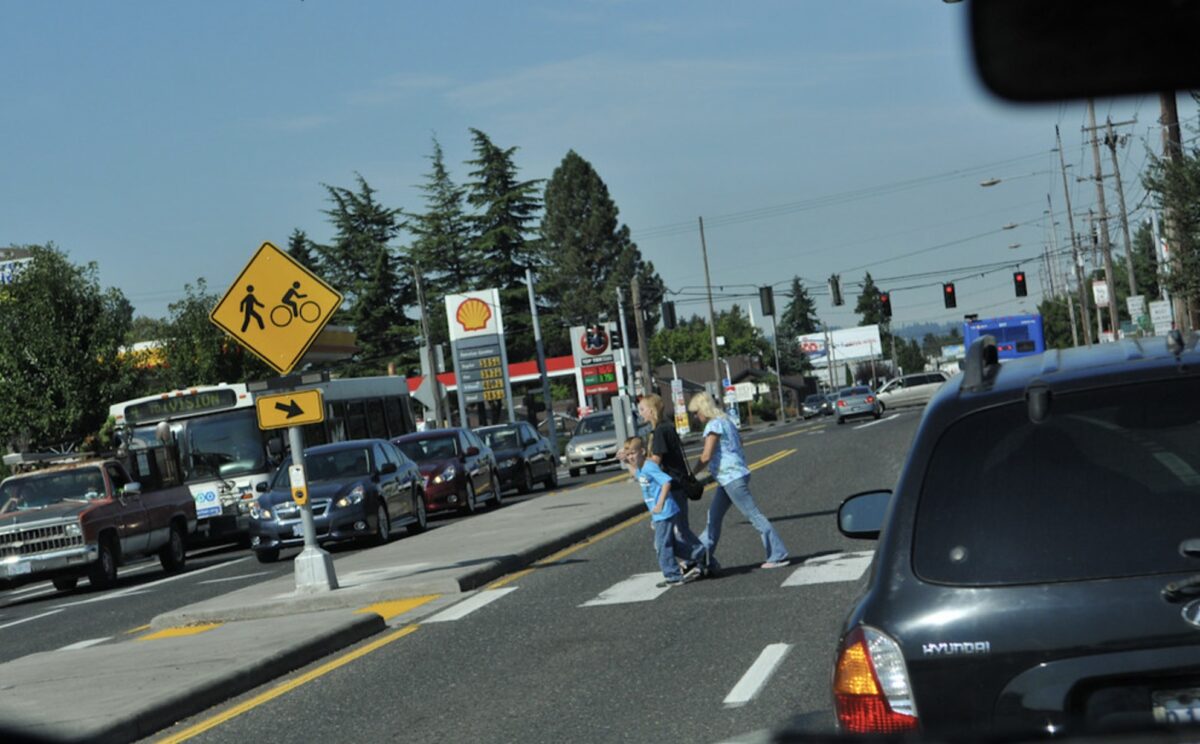
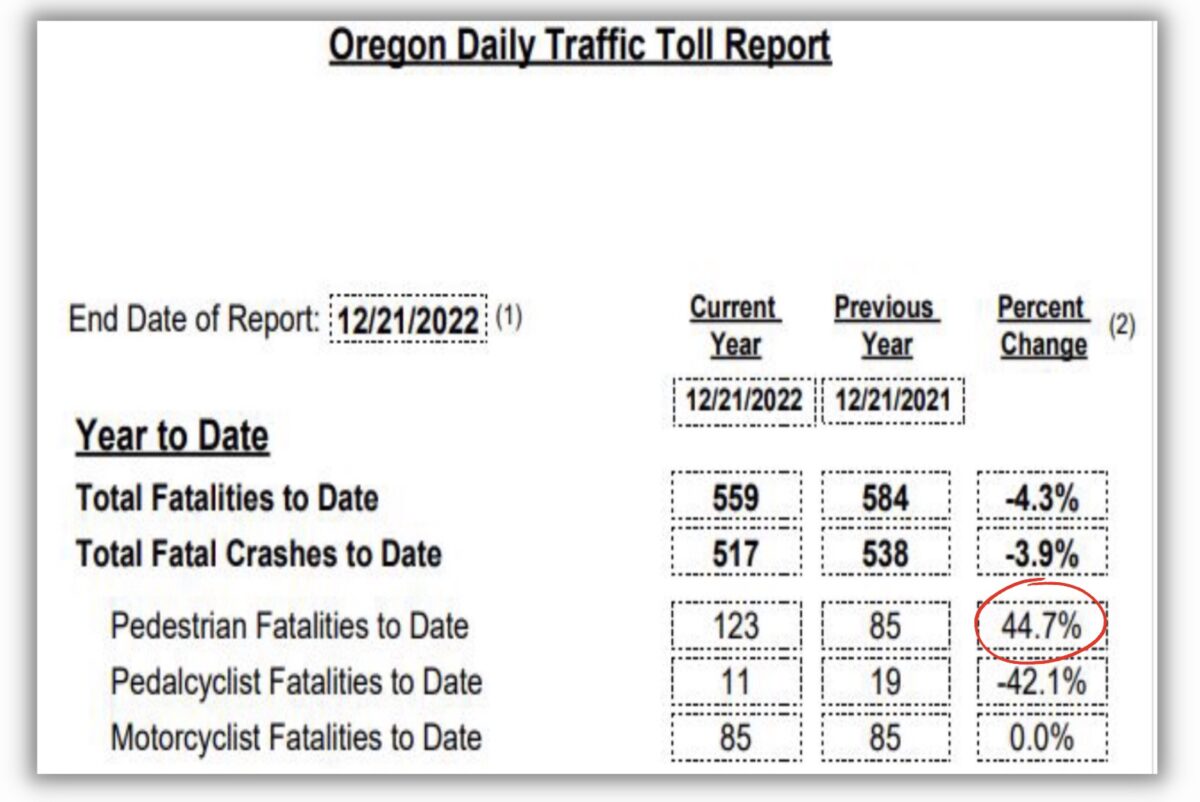


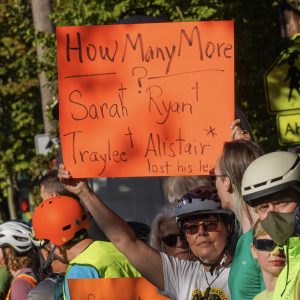
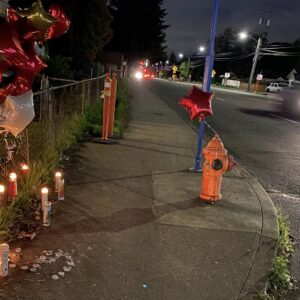
Thanks for reading.
BikePortland has served this community with independent community journalism since 2005. We rely on subscriptions from readers like you to survive. Your financial support is vital in keeping this valuable resource alive and well.
Please subscribe today to strengthen and expand our work.
I couldn’t agree more strongly. ODOT says they’re all about safety. But safety for whom?
Right now you can’t ride your bike safely on Barbur Blvd southbound. Somebody – probably PBOT, by mistake – swept the east side of Barbur, but the west side remains unswept. It’s like cycling on marbles. Where’s ODOT’s concern for the safety of cyclists?
Still, if the people in cars feel safe, then ODOT’s leaders must feel they have done their job.
70% of pedestrians killed in 2021 were homeless according to PBOT. Yet the Street Trust under Iannarone fought to keep encampments on designated Safe Routes to School.
Street Trust has absolutely zero credibility in my opinion and the organization is running on fumes, now mostly a springboard for the director’s so-far failed political aspirations. I’ve heard enough.
Hey , for a $Million dollar a year budget, you get this sternly worded 6 point plan.,.
They just need more donations and then you will get a 10 point plan, I promise….
What do you suggest The Street Trust do that it isn’t doing now?
In all sincerity, if you have the secret sauce for winning the battle against the Car Industrial Complex, I imagine most people here would be all ears.
They have a Million dollar budget, they should figure it out, not me.
It’s a good salary for a few people that you and I pay for.
Since you can’t tell me what they do, they are not very effective are they?
It’s very expensive Secret sauce.
One thing they don’t do is anything for bicycles as you point out with your comment.
I’m not here to defend or decry them, but I would say this: a millions bucks ain’t much compared to the tens of millions of (also our) tax dollars being spent selling the public on freeway expansions on i205, RQ, and i5 bridge. Nor is it much compared to the billions of dollars spent on car ads. And it’s truly minuscule compared to the trillions in built infrastructure, centered on cars, since WWII.
All I’m saying is, “a million dollar budget” is a catchy phrase, but should be put into context. They—and frankly all advocates, both professional and volunteer—are fighting the good fight with sticks against nukes. We still fight because it’s the right thing to do, but to denounce those efforts bc the war hasn’t yet been won is, in my humble opinion, missing quite a lot of context.
Let’s get a beer/coffee/ride, this would be fun to discuss.
“What do you suggest The Street Trust do that it isn’t doing now?”
Show some concrete results that would justify the organization’s existence.
Many, many nonprofits outlive their usefulness and continue on, sucking up resources and taking up space. We’d all be better off if they would disband and make room for new voices when their race is done.
We should have 2 comments of the week! This one by Watts and the one by Dave Fronk. Until we can have Portland/Oregon transportation advocacy groups that can appeal to more than just a select few on one end of the political spectrum there will be no buy in or change. Unfortunately our current nonprofits (Street Trust, Oregon Walks) have become some polarized they have lost all effectiveness.
I don’t think that is how it works. I like some of the points on the list but it actually doesn’t matter to me if the Street Trust is senescent. They will do the best they can and if that is not enough it’s on the rest of us to fill in.
Those of us who dropped the BTA can’t say much about what the Street Trust gets up to.
In particular I like the idea of a thorough investigation of every fatal crash. In 11 days last year USA car crashes killed as many individual humans as died in ALL scheduled major airlines WORLDWIDE. (None on US airlines). In the US we have decided that it’s OK for 16 people to die every day in service of operating cars.
It’s an open secret that air travel is many many times safer than driving. Plus, many more than 16 people die on US roads every day, it’s closer to 100 per day in the US.
I realize that. Organizations typically go into self-perpetuation mode rather than shut up shop when they’ve run out of momentum. That’s how it works.
I’m saying that it should work differently.
My suggestion for The Street Trust (and other advocacy orgs nationwide, like Transportation Alternatives in NYC) would be to focus more on marketing to the general public, i.e. “positive propaganda” that makes safer streets more of a mainstream political issue than the niche/fringe issue it is now.
If they can get more people to care about an issue (which they can—good marketing can get people to care about *anything*—see cigarettes, cars, etc.), then they would also get more donations, leading to a bigger budget, leading to more of a marketing budget, in a virtuous cycle.
Unfortunately, most advocacy groups these days are pretty much just preaching to the choir, which is understandable because good marketing is hard. But I think investing in an Ogilvy-worthy marketing campaign would be worth it.
No amount of “marketing” (Fordist capitalist propaganda) by tiny captured nonprofits is going to erase the deeply embedded culture of automobility or its staggering array of subsidies.
Comment of the week!
The most efficacious thing The Street Trust could do to cut traffic deaths in Portland is to fully support offering shelter and eliminating dangerous street camping. I’m doubtful Inarone would ever support something pragmatic like that though.
We just keep handing out free tents for dangerous street side camping and think things will get better. Unfortunately traffic deaths are tracking our homeless crisis and crime wave in lock step.
The Street Trust is an organization that is led by such a divisive extremist that it has become one without value to our community. I hope we can develop a transportation advocacy group in Portland that more than just political extremists would be willing to support. We need safe active transportation to go mainstream!
Having had the displeasure of working with the Street Trust’s leader in the past, I will never ever support anything they work on no matter how altruistic it may be (not that they’ll ever do anything that isn’t over the top extremist).
Yep and I’m sure many at PBOT and ODOT feel the same.
This term “extremist” keeps coming up, to what is this referring? My main complaint about Street Trust is that they’re too mild in their approach.
No offense but I think you may be an extremist. It’s hard to self label as such as it’s a negative word. But it helps to objectively look at your position and understand how it fits into the spectrum of opinions people have. Once you recognize where yours fit you can decide and analyze how and if you want to convince other people and how you might successfully engage with them if your opinions are seen as extemist.
This wasn’t helpful at all. My question was directed at “Leon M” and “SolarEclipse,” it should have been obvious I was asking what actions of Street Trust could be considered extremist. Others have said they’re too ineffective/milquetoast, I wonder how it can be both.
I don’t want to speak for them, but I think that SolarEclipse and Leon M might see Sarah Iannarone as a progressive (In the Bernie, AOC, Ilhan, Rashida ways.)
There are folks here who have hated all of our local progressives with a passion, (like Sarah Iannarone, JoAnne Hardesty, Chloe Eudaly, Steve Novic, all the way back to Eric S.)
I’ve heard Sarah speak at events a few times, and I thinks shes pretty awesome. I actually have more trust in the Street Trust under her leadership than I ever had during 20+ years of Street Trust/ BTA leadership.
Sure… but what have they accomplished under her leadership?
This is not a fair argument. You don’t even know, but are willing to criticize?
Well, I think I do know… nothing. Which is why I’m critical of the organization.
Are all the people sniping at the Street Trust and its Executive Director dues paying members? If so they have a vote within the organization. If not they are wasting time. The Street Trust is not government and it is not responsible to random people. The name IS a little crazy, maybe their website has an explanation for that.
ODOT’s budget is about 3 billion dollars a year.
The Street Trust receives significant government (taxpayer) funding. $332,000 in 2019 (the last year they disclosed their financials) . This taxpayer funding needs to end.
Leon, Which of their programs do you specifically want unfunded? Safe Routes to School? We Bike? Bike Commute Clinics? Other? What specifically would you want to replace them with?
Looking forward to your thoughtful reply.
https://www.thestreettrust.org/programs/
Any group that calls for less police in Portland and a closure of all Portland arterials to vehicles in order to “ save the homeless” is not rational enough to be the recipient of public funds.
Answer any of my questions, tho?
Why doesn’t Street Trust also specifically recommend installation of
RF or HAWK beaconsat unsignalled crosswalks on busy streets. Common in Seattle area. They work!
https://snohomishcountywa.gov/DocumentCenter/View/22569/HAWKbeacon
I thought they helps advocate for the first HAWK signals to Portland. Why are you saying otherwise?
I would like to see No Turn On Red added with camera enforcement. Also enforcement of driving impaired/distracted and unlicensed vehicles.
I almost can’t believe I’m saying this, but enforcement of basic traffic laws should be a part. Already entitled motorists are now emboldened by the culture of impunity. It’s not even necessary – in practice- to have an identifying mark anymore (i.e. plates).